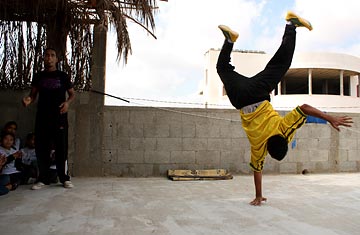
Ahmed al-Ghiez, 20, also known as "Shark B-boy," dances and flips for an audience of Palestinian school children in Khan Younis, a town in the Gaza Strip
Mohammed al-Ghiez sets his laptop down on the concrete rooftop of a school in the central Gaza Strip. As he turns up the music — a blend of American hip-hop, techno and Palestinian rap — the rest of his B-boy crew starts warming up by jumping rope, stretching and shaking their limbs to the beat.
This is hardly a typical Monday-morning scene in the deeply conservative Gaza Strip, ruled by the Islamists of Hamas, and where Western pop culture is largely shunned. But you wouldn't know it to watch al-Ghiez — also known as "Funk B-boy" — and his five friends prepare to teach more than a hundred Palestinian schoolchildren the art of break dancing.
"When I first saw break dance, I said to myself, 'What is that amazing dance?' " says al-Ghiez, who first encountered the style on the Internet while living in Saudi Arabia. By 2005, he had formed Gaza's first break-dancing crew, Camps Breakerz. Now, he says, "I think all of Gaza knows what break dance is."
Despite the initial skepticism of their activities and hip-hop dress style — outlandish in socially conservative Gaza — the free shows they put on throughout Gaza quickly won over critics. The rooftop session attended by TIME was part of a series of workshops launched by Camps Breakerz in cooperation with Save the Children, aimed at introducing Gaza's youth to something other than violence. "I want them to see a good way of life," says al-Ghiez. "I want to tell them that they can dance and play and do everything in life; that they can think about other things besides the siege and war. Yes, we live under siege. But you can get your freedom this way."
And so infectious is the Camps Breakerz beat that even Hamas seems to be feeling it: the B-boy crew has the endorsement of Gaza's Hamas-run ministries of culture and education.
"We know that culture and art play an important role in personal expression and in sending the Palestinian message to the outside world," Culture Minister Osama Alisawi tells TIME. "It is important that we support all cultural activities that do not contradict the tradition and customs of Palestinian society."
Those traditions and customs are relatively conservative, of course, and break dancing hardly fits the mold of a society that demands modest dress codes and strictly regulates gender interactions. But the authorities see a value in the message Camps Breakerz are promoting.
"We are not just dance," says al-Ghiez. "Most shows have a message. We are telling people about our situation and our lives. We mix drama into the shows to tell people about the suffering in Gaza."
The government is more cautious in its enthusiasm for the art form. "It's considered a type of sport," Alisawi says hesitantly of the B-boys' moves. "And they have singers who sing about the plight of the Palestinians, so we support them in that."
Living in a territory under siege, the members of Camps Breakerz certainly have no problem "keeping it real," to borrow a phrase from the U.S. hip-hop lexicon. Last winter's Israeli offensive in Gaza left one of the group's founding members, Ahmed Ismail, permanently crippled and no longer able to dance. An air strike destroyed a sports club in which the boys had recently rented space to practice.
Even so, no sooner had the guns gone silent than al-Ghiez and his B-boys, who range in age from 13 to 25, were back on the dance floor, even if it had become their family living rooms. "When the war finished, the first thing we did was meet and make a video," says al-Ghiez. "We were back alive again. Oh my God, it was good to see each other after the war." And their indomitable spirit seemed to be a salve that a recovering Gaza needed, judging by the growing demand for their shows.
On the rooftop of the Moussa Bin Omar School on Oct. 12, the B-boys blast their music for kindergartners and primary-school students, first joking and juggling and performing their best moves, and then inviting the kids, both boys and girls, to try a few moves of their own.
"Come on up, Alaa!" says Ibrahim Abu Ramadan (a.k.a. "Dark B-boy"), calling to a 5-year-old who has raised his hand. Alaa, apparently inspired by what he has just seen, cartwheels out of the crowd.
"This is the first time I've seen something like this," says Nisreen al-Rjal, a local teacher. "This is good for them. Throughout the war, the children were exposed to a lot of violence. That creates psychological pressure ... These kids are scared of every sound. They're anxious."
Her point was underscored earlier during the workshop, when an unidentified explosion in a nearby building sent the children scurrying.
Camps Breakerz members say their ultimate goal is to travel abroad to participate in international competitions. They may have received a few invitations, but the ongoing Israeli blockade makes travel unlikely. Still, the break dancers are optimistic about their growing popularity.
"I think one day we will do a show for the Prime Minister of Palestine," says al-Ghiez. "Now we're just waiting for the siege to lessen. We can't breathe ... If we had freedom, if I was just able to leave Gaza, I could do a lot of tours."
